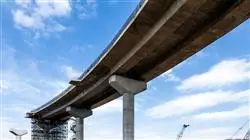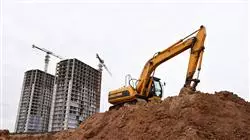University certificate
Scientific endorser

The world's largest faculty of engineering”
Introduction to the Program
This program will take you in an intensive way to acquire new knowledge in Civil Engineering and Infrastructure development, incorporating the most interesting novelties in this field in the international panorama"

The Civil Engineering sector is one of the main pillars of world economies, both because of the investment it requires and the economic impact of this investment, as well as for the structuring of the territory, which is essential for modern economies to develop at the pace imposed by the world economic order.
Civil Engineering is constantly evolving, both technologically and geographically. Moreover, this sector is not exempt from the digitalization that is being imposed in all business areas, so, in order to prepare the professional in this field, special emphasis is placed on both the need to implement digitalization within the business structures, as well as on the knowledge of the new tools offered by the new technology sectors, to achieve the digitalization that is essential in these times.
Another aspect that has been highlighted in recent years as being of vital importance for construction businesses is internationalization. Therefore, this program will explore the opportunities offered by the international market, through multilateral tenders financed by guarantee entities.
As it is an 100% online program, the student is not bound by fixed schedules or the need to move to another physical location, rather, they can access the content at any time of the day, balancing their professional or personal life with their academic life.
The construction of quality elements that are resistant to the passage of time requires the mastery of the new forms of intervention that have burst into this field"
This Professional Master's Degree in Infrastructure and Civil Engineering contains the most complete and up-to-date educational program on the market. The most important features include:
- The development of case studies, presented by experts in Infrastructure and Civil Engineering
- The graphic, schematic, and practical contents with which they are created, provide scientific and practical information on the essential disciplines for professional practice
- Practical exercises where the self-assessment process can be carried out to improve learning
- Special emphasis on innovative methodologies in Infrastructure and Civil Engineering
- Theoretical lessons, questions to the expert, debate forums on controversial topics, and individual reflection assignments
- Content that is accessible from any fixed or portable device with an Internet connection
This Professional Master's Degree is the best investment you can make when selecting an up-to-date program in the field of Civil Engineering. We offer you quality and free access to content"
It includes, in its teaching staff, professionals belonging to the field of Civil Engineering, who contribute their work experience in this update, as well as recognized specialists from prestigious reference societies and universities.
Its multimedia content, developed with the latest educational technology, will allow the professional a situated and contextual learning, that is, a simulated environment that will provide an immersive update, programmed to learn in real situations.
This program is designed around Problem-Based Learning, whereby the professional must try to solve the different professional practice situations, that arise throughout the program. To do so, the professional will be assisted by an innovative interactive video system, created by renowned and experienced experts in Infrastructure and Civil Engineering.
A complete process of professional growth, which includes the processing of Civil Engineering data through BIM, an inevitable necessity for the sector"

Intensive, top-quality qualification designed to optimize the time spent by students in the program"
Why study at TECH?
TECH is the world’s largest online university. With an impressive catalog of more than 14,000 university programs available in 11 languages, it is positioned as a leader in employability, with a 99% job placement rate. In addition, it relies on an enormous faculty of more than 6,000 professors of the highest international renown.

Study at the world's largest online university and guarantee your professional success. The future starts at TECH”
The world’s best online university according to FORBES
The prestigious Forbes magazine, specialized in business and finance, has highlighted TECH as “the world's best online university” This is what they have recently stated in an article in their digital edition in which they echo the success story of this institution, “thanks to the academic offer it provides, the selection of its teaching staff, and an innovative learning method aimed at educating the professionals of the future”
A revolutionary study method, a cutting-edge faculty and a practical focus: the key to TECH's success.
The most complete study plans on the university scene
TECH offers the most complete study plans on the university scene, with syllabuses that cover fundamental concepts and, at the same time, the main scientific advances in their specific scientific areas. In addition, these programs are continuously being updated to guarantee students the academic vanguard and the most in-demand professional skills. In this way, the university's qualifications provide its graduates with a significant advantage to propel their careers to success.
TECH offers the most comprehensive and intensive study plans on the current university scene.
A world-class teaching staff
TECH's teaching staff is made up of more than 6,000 professors with the highest international recognition. Professors, researchers and top executives of multinational companies, including Isaiah Covington, performance coach of the Boston Celtics; Magda Romanska, principal investigator at Harvard MetaLAB; Ignacio Wistumba, chairman of the department of translational molecular pathology at MD Anderson Cancer Center; and D.W. Pine, creative director of TIME magazine, among others.
Internationally renowned experts, specialized in different branches of Health, Technology, Communication and Business, form part of the TECH faculty.
A unique learning method
TECH is the first university to use Relearning in all its programs. It is the best online learning methodology, accredited with international teaching quality certifications, provided by prestigious educational agencies. In addition, this disruptive educational model is complemented with the “Case Method”, thereby setting up a unique online teaching strategy. Innovative teaching resources are also implemented, including detailed videos, infographics and interactive summaries.
TECH combines Relearning and the Case Method in all its university programs to guarantee excellent theoretical and practical learning, studying whenever and wherever you want.
The world's largest online university
TECH is the world’s largest online university. We are the largest educational institution, with the best and widest online educational catalog, one hundred percent online and covering the vast majority of areas of knowledge. We offer a large selection of our own degrees and accredited online undergraduate and postgraduate degrees. In total, more than 14,000 university degrees, in eleven different languages, make us the largest educational largest in the world.
TECH has the world's most extensive catalog of academic and official programs, available in more than 11 languages.
Google Premier Partner
The American technology giant has awarded TECH the Google Google Premier Partner badge. This award, which is only available to 3% of the world's companies, highlights the efficient, flexible and tailored experience that this university provides to students. The recognition as a Google Premier Partner not only accredits the maximum rigor, performance and investment in TECH's digital infrastructures, but also places this university as one of the world's leading technology companies.
Google has positioned TECH in the top 3% of the world's most important technology companies by awarding it its Google Premier Partner badge.
The official online university of the NBA
TECH is the official online university of the NBA. Thanks to our agreement with the biggest league in basketball, we offer our students exclusive university programs, as well as a wide variety of educational resources focused on the business of the league and other areas of the sports industry. Each program is made up of a uniquely designed syllabus and features exceptional guest hosts: professionals with a distinguished sports background who will offer their expertise on the most relevant topics.
TECH has been selected by the NBA, the world's top basketball league, as its official online university.
The top-rated university by its students
Students have positioned TECH as the world's top-rated university on the main review websites, with a highest rating of 4.9 out of 5, obtained from more than 1,000 reviews. These results consolidate TECH as the benchmark university institution at an international level, reflecting the excellence and positive impact of its educational model.” reflecting the excellence and positive impact of its educational model.”
TECH is the world’s top-rated university by its students.
Leaders in employability
TECH has managed to become the leading university in employability. 99% of its students obtain jobs in the academic field they have studied, within one year of completing any of the university's programs. A similar number achieve immediate career enhancement. All this thanks to a study methodology that bases its effectiveness on the acquisition of practical skills, which are absolutely necessary for professional development.
99% of TECH graduates find a job within a year of completing their studies.
Professional Master's Degree in Infrastructure and Civil Engineering
The design, construction and maintenance of infrastructures is an activity strictly dependent on technological advances, both in terms of machinery and in the use and exploitation of various materials. Therefore, it is essential for the professional in this area to specialize their knowledge regarding the development of economic and sustainable projects. With this Professional Master's Degree offered by TECH Global University, engineers will be able to update their knowledge in topics corresponding to the types of works (linear, hydraulic, maritime, airport, industrial) and their respective previous phases. The program's syllabus also covers topics such as: contracting, planning, settlement and closure of works; conservation, maintenance and repair of infrastructures; and finally, safety, health and the environment. Through the contents designed by the teaching team, students will be able to analyze practical and real cases, essential for the acquisition of academic and work skills, which they will gradually integrate into the practice of their profession.
Postgraduate course in Infrastructure and Civil Engineering
The design and implementation of infrastructure projects is essential for the development of the economic and industrial sector of the countries, because through them it is possible to modernize urban and rural areas, in order to advance productive and distributive processes. This postgraduate course at TECH enables engineers to perform the intrinsic tasks of their profession, emphasizing the internationalization of the criteria of construction companies when designing multilateral tenders. By emphasizing this aspect, TECH ensures the insertion of its students in the project finance labor market, backed by guarantee entities. Similarly, our program emphasizes the importance of mastering the regulatory frameworks of administrative processes and environmental considerations in order to extrapolate their knowledge to other industry sectors for the sake of innovation and sustainability. To ensure compliance with these last two items, in the contents of the Professional Master's Degree in Infrastructure and Civil Engineering, special attention is given to competencies in new technologies, used in machinery and software, deepening, for example, in the use of the BIM method.







